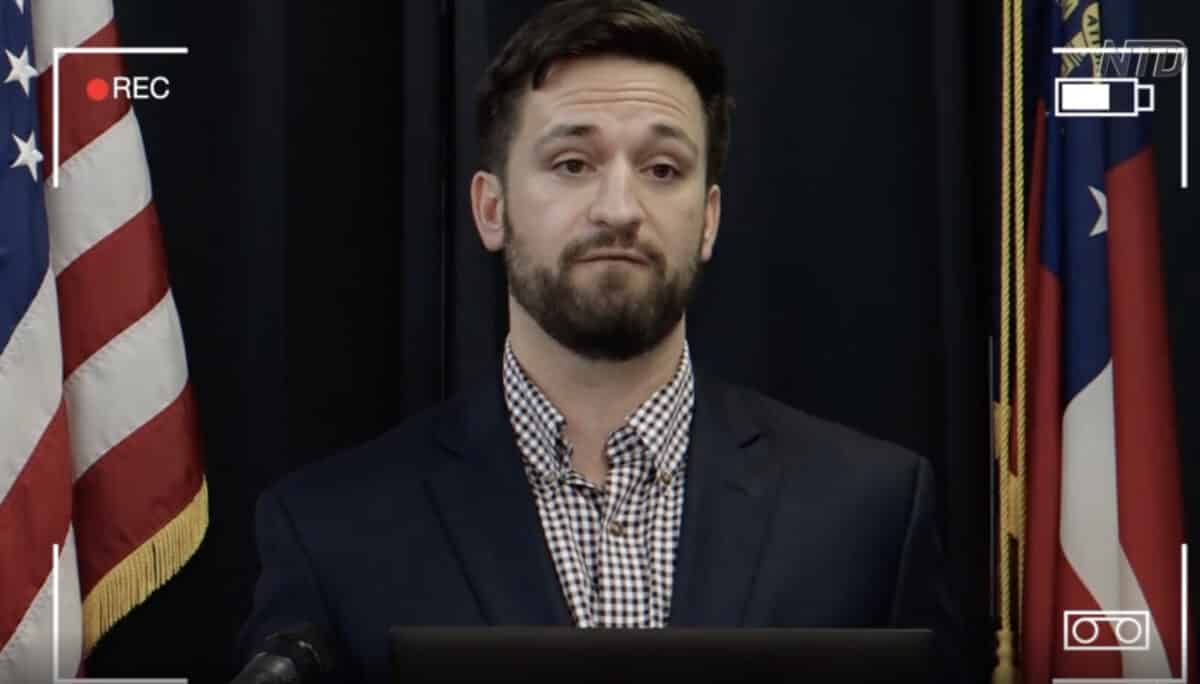Alex Cruce obtained election data from the Georgia Secretary of State’s office, publicly accessible on their website, and in his analysis found things that were troubling.
It started when a neighbor of his checked on the MyVoter registrar to see the status of her ballot, and found it was completely grayed out, and an inquiry to the Secretary of State’s office yielded no responses.
“Stories begin to multiply and I discovered that there was open access to see what was going on with absentee ballots and early voting. That period of two weeks I watched one of my neighbors who was a dear friend break down in tears she cheated in between taking care of two rambunctious little boys while working out of her home due to COVID,” he said. “She went over to Northside library in Fulton County. She voted. She thought she did. Everything went smooth. Nobody stopped her. She was proud to be an American that day. The problem is that a vote was not counted. The MyVoter page was grayed out. From the data that I downloaded, I looked up knowing that I’d found my name and I’d had been counted. I found her tried to find her name in the same way. But nothing.”
“There’s not a trace. There’s not even her name, not a C [cancelled], not an A [accepted], not an R [rejected], nothing,” he said. “She’s been an active voter for the past 15 years living in Fulton County, in the same house for 15 years.”
“Another story here with Donna Vogel, 90 years old, late husband fought bravely for this country in World War II, fought in the Battle of Iwo Jima. But she’s something else as well. She’s a trailblazer. While living in Indiana, she was one of the first female disc jockeys. But it’s hard to get that out of her because she’s humble and she loves God above all else,” he said.
“Donna received five absentee ballots applications. She sent one of them in thinking that she had voted for the country, for the President of the United States,” Cruce said. “But then my wife started to be concerned. So she started reaching out to her friends.”
His wife and Donna were in the same Bible study group, so she pulled up Donna’s name online to check her ballot status.
“She’s not there either. No trace. So now Donna, 90 years old, heartbroken,” he said. “Considering the dangers of COVID, she’s going to vote in person on January 5, for the Senate race.”
“I went from watching somebody to cry, to bringing me to tears. This is a woman that’s been in this country for 90 years. She’s broke barriers. Her husband fought in foreign wars, and she reaches out to the Secretary of State and nothing. They don’t know what to tell her,” he said.
In another case, someone asked him to check for her name. She had applied for an absentee ballot and received one on Nov. 3. She was worried she wouldn’t have time to go to the polls, and put the absentee ballot in one of the drop-off boxes.
In a testimony, he focused on the Fulton County early absentee ballots. The data he obtained showed that there is a ledger that keeps up with every ballot that is sent out, with several classifications for what might have happened to a ballot, including whether it was soiled or damaged and needed to be replaced, meaning each should be able to be accounted for in some way.
“This drove me to look at things and try to understand what was going on,” he said. “And you know, how many times does this happen in Fulton County alone?”
“Well, the answer is 22,021 times. 22,000 ballots that were blank. Now, could they have voted at the polls? Maybe. Very slim chance. Just according to the actual vote numbers,” he said. “The total people that registered, the voter ID is not connected to any other votes in Fulton County.”
“They’re thinking that their vote counted, but it did not,” he said.
Unfortunately, it wasn’t just a local issue, he found.
“So is this just in Fulton County? No, it actually exist around the state. We’ve calculated over 90,000 votes that are left blank,” he said.
He also found a handful of other anomalies, like dozens of ballots postmarked as late as Nov. 29, and ballots issued on dates that were later than when they were received by the registrar. Then there were about 1,300 votes that were issued, mailed out, received, filled out, sent back, and processed by the registrar within what Cruce said were likely impossible timeframes, between one and three days in many cases.
“And this is only a few statistics that I chose to to look at. There’s for so many more,” he said.
“It’s extremely heartbreaking,” he said. “I’ve thought about this a lot, and I like to think that if this was the shoes on the other foot, would I be strong enough to to recognize what is right and wrong. I think that this is definitely wrong. I see people that I’ve been friends with I’ve known for a long time. … they feel cheated and it’s a horrible, it’s a horrible feeling. I can only imagine.”






